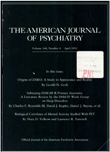The normalcy of self-proclaimed "normal volunteers"
Abstract
Volunteers who claimed they were "healthy and normal" and did not reveal any physical or mental abnormality or medication use during brief structured interviews underwent detailed structured interviews with the Schedule for Affective Disorders and Schizophrenia. Diagnoses were based on the Research Diagnostic Criteria (RDC), and family history was determined with the Family History RDC. Of the 121 volunteers, 16.5% met criteria for diagnoses of current mental disorders. Of the 104 without current DSM-III axis I diagnoses, 35.6% had past histories and 39.4% had family histories of mental illness. These results emphasize the need for thorough assessment of "normal volunteers."
Access content
To read the fulltext, please use one of the options below to sign in or purchase access.- Personal login
- Institutional Login
- Sign in via OpenAthens
- Register for access
-
Please login/register if you wish to pair your device and check access availability.
Not a subscriber?
PsychiatryOnline subscription options offer access to the DSM-5 library, books, journals, CME, and patient resources. This all-in-one virtual library provides psychiatrists and mental health professionals with key resources for diagnosis, treatment, research, and professional development.
Need more help? PsychiatryOnline Customer Service may be reached by emailing [email protected] or by calling 800-368-5777 (in the U.S.) or 703-907-7322 (outside the U.S.).



